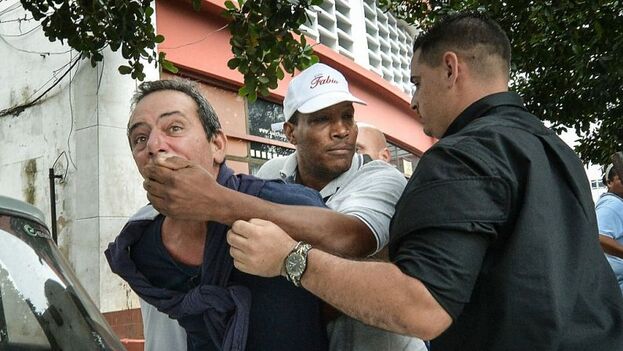
![]() EFE/14ymedio, Havana, 30 October 2022 — the Cuban press is suffering “constant repression” and “control of their telecommunications”, and is living through “the greatest exodus in history”, according to a report released on Sunday during the 78th General Assembly, in Madrid, of the Inter American Press Association (IAPA).
EFE/14ymedio, Havana, 30 October 2022 — the Cuban press is suffering “constant repression” and “control of their telecommunications”, and is living through “the greatest exodus in history”, according to a report released on Sunday during the 78th General Assembly, in Madrid, of the Inter American Press Association (IAPA).
The document reveals that journalists on the Island are subjected to constant “harassment” and “threats” from a government-driven “repressive framework against press freedom”, which in the past year has significantly increased its relentless crackdown on independent reporters, on the diffusion of news content on social media channels, and on any digital media not under the control of the Communist Party.
In many cases this ends up with police summonses, and, in the worst case scenario, imprisonment, according to the IAPA.
The organisation recalls that the Cuban journalist and activist Lázaro Yuri Valle Roca — detained since June 2021 — was condemned to 5 years in jail for the crimes of “continuous enemy propaganda, and resistance” and remains imprisoned despite his “grave state of health”, according to the association.
These sanctions will be reinforced, according to the organisation, by the new Penal Code — approved in May — which comes into force on 1 December and which severely penalises the practice of journalism outside of the official media.
Through this Code, “Every aspect of journalistic work will be persecuted, anyone critical of state officials will be punished by imprisonment and the authorities will have guaranteed impunity”.
One of the punishments being considered by the Code is that of 10 years in prison for the “receipt, possession and use of foreign funding”, which would put maximum restriction on the financing of any media outside of the state ’bubble’.
Otherwise, journalists not imprisoned will be subject to “police summons, house arrest, and cutting off of internet”, the IAPA added.
House arrest without judicial mandate “may last from several hours to several weeks”. In a similar manner, the government is putting pressure on house proprietors to evict any tenant who is a journalist critical of the government, such as the photographer María Lucía Expósito.
Another form of repression, notes the report, is the imposition of lofty fines on journalists. Ismario Rodríguez was fined 4,000 pesos for “illicit economic activity –a justified punishment for those who practice journalism without permission”.
This is similar to another case – that of journalist Camila Acosta – fined 1,000 pesos for “public disorder”, “accused of trying to cover the 11 July 2021 protests”.
The report also covers the role of the state Telecommunications Company of Cuba, SA (Etecsa). The internet network “is spied upon and censured” and, on many occasions, jammed during events such as the 11J anti-government protests.
In addition, the IAPA makes the point that the “state monopoly (…) blocks the websites of tens of independent news media organisations, and of various human rights NGOs”.
According to the IAPA, some 20 reporters, photographers and illustrators gave up working for the independent press after six of them were prohibited from travelling to an event”. The text alluded to the El Toque media case.
Last Thursday, a programme broadcast during the peak schedule of Cuban television lashed out at this media outlet and showed video of El Toque reporters admitting having received foreign funding. They had to make a public renunciation in order to continue contributing to this media outlet.
In addition to journalists of the Cuban independent press, the report also looks at situations such as the dismissal of “Armando Franco, director of the official magazine Alma Mater, for publishing information about 11J detainees”.
Similarly, “accredited members in Cuba” of international agencies “AP, Reuters and EFE denounced limitations on their work”.
Translated by Ricardo Recluso
____________
COLLABORATE WITH OUR WORK: The 14ymedio team is committed to practicing serious journalism that reflects Cuba’s reality in all its depth. Thank you for joining us on this long journey. We invite you to continue supporting us by becoming a member of 14ymedio now. Together we can continue transforming journalism in Cuba.
